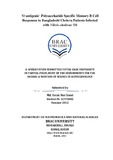| dc.contributor.advisor | Qadri, Professor Dr. Firdausi | |
| dc.contributor.advisor | Choudhury, Professor Dr. Naiyyum | |
| dc.contributor.author | Sami, Md. Israk Nur | |
| dc.date.accessioned | 2015-04-16T06:52:10Z | |
| dc.date.available | 2015-04-16T06:52:10Z | |
| dc.date.copyright | 2015 | |
| dc.date.issued | 2015-03 | |
| dc.identifier.other | ID 12376002 | |
| dc.identifier.uri | http://hdl.handle.net/10361/4102 | |
| dc.description | This thesis report is submitted in partial fulfillment of the requirement for the degree of Masters of Science in Biotechnology, 2015. | en_US |
| dc.description | Cataloged from PDF version of thesis report. | |
| dc.description | Includes bibliographical references (page 62-68). | |
| dc.description.abstract | Cholera, caused by Vibrio cholerae O1/O139, is an acute dehydrating enteric disease
with high mortality rate if untreated. Several efforts have been made to develop
effective vaccines, and effort is still continuing. The available oral cholera vaccines
provide protection for 3-5 years in adult and for shorter duration in younger children.
However, it was observed that natural infections in cholera endemic areas provide
longer term protective immunity lasting for 7-10 years, but the mechanism is not
completely understood. It was hypothesized that this protective immunity may be
mediated by memory B cell responses. In this study 60 hospitalized cholera culture
confirmed patients were evaluated for their immune response up to 180 days after
onset of illness. A method of polyclonal stimulation of peripheral blood mononuclear
cells followed by an enzyme-linked immunospot assay was used to study memory B
cell responses specific to V. cholerae O1 antigens, lipopolysaccharide (LPS) and Ospecific
polyscaccharide (OSP) of LPS. To observe circulating plasma antibody
responses enzyme-linked immuno assay accompanied with memory B cell studies
were carried out at different study points. All patients exhibited LPS and OSP-specific
memory B cell proliferation by day 30. LPS-specific IgG and IgM memory B cell
responses were elevated throughout the follow up days, while LPS IgA response
magnitude waned down by day 90, but persisted up to day 180. However, OSPspecific
IgA, IgG and IgM memory B cell response were found at day 30. The OSPspecific
IgA and IgG memory B cell responses were elevated throughout the whole
study period, while IgM responses started to wane down by day 180. Significant level
of LPS and OSP-specific circulating plasma antibody for all the antibody isotypes
were observed. Results suggested that such memory B cells might persist for longer
period providing protective immunity against subsequent exposure to cholera. A
vaccine, targeted to generate memory B cell, preferably OSP-specific will be
important for evaluating effectiveness of vaccines and for design and formulation of
future effective cholera vaccines. | en_US |
| dc.description.statementofresponsibility | Md. Israk Nur Sami | |
| dc.format.extent | 75 pages | |
| dc.language.iso | en | en_US |
| dc.publisher | BRAC University | en_US |
| dc.rights | BRAC University thesis are protected by copyright. They may be viewed from this source for any purpose, but reproduction or distribution in any format is prohibited without written permission. | |
| dc.subject | Biotechnology | en_US |
| dc.title | 'O antigenic' polysaccharide specific memory B cell responses in Bangladeshi Cholera patients infected with Vibrio cholerae O1 | en_US |
| dc.type | Thesis | en_US |
| dc.contributor.department | Department of Mathematical and Natural Science, BRAC University | |
| dc.description.degree | M. Biotechnology | |

